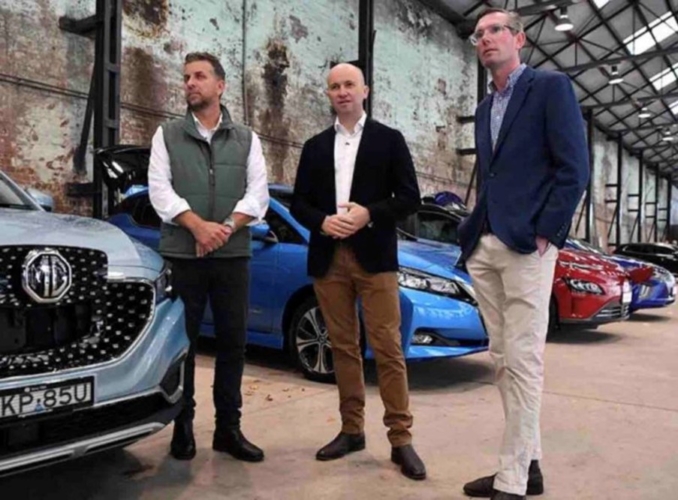20/06/21; The Driven

The Berejiklian government has unveiled an ambitious $490 million package of new incentives, tax cuts and spending on new fast-charging infrastructure for electric vehicles – some of the best available in Australia – but it comes with a major catch.
The ambitious funding package has been revealed ahead of the next NSW government budget, and includes a wide a range of measures to cut the upfront costs of electric vehicles for early adopters, a commitment to transition the entire government vehicle fleet to all-electric models by 2030 and includes a $171 million spend on new charging infrastructure across the state.
Under the plan, the NSW government will waive stamp duty for electric vehicles priced under $78,000 – just below the luxury car tax threshold – and an additional $3,000 rebate will be available for the first 25,000 purchases of battery and hydrogen fuel cell vehicles with a price below $68,750. The support is designed to both lower the cost of electric vehicles, as well as encourage car makers to bring lower cost models into the Australian market.
But this extra support will be counterbalanced by new fees to be paid by electric vehicle drivers, with the NSW government becoming the latest jurisdiction to introduce a road user fee for electric vehicles, similar to a new per-kilometre tax introduced in Victoria. It is understood that the introduction of a per-kilometre tax on electric vehicles in New South Wales has been ‘deferred’ and will commence in 2027.
“Our comprehensive strategy is about making sure we have the right mix in place to incentivise the take-up of electric vehicles while ensuring everyone who drives on our roads contributes to funding and maintaining them,” NSW Treasurer Dominic Perrottet said.
“Our strategy also commences long-term major tax reform. Today we begin the process of permanently phasing out stamp duty on electric vehicles and a deferred transition to a fair and sustainable per-kilometre road user charge for electric vehicles.”
“From young adults saving for their first car in Western Sydney to retirees planning a road trip to Broken Hill, these incentives will make electric vehicles accessible and affordable for all NSW residents,” Perrottet added.
The reforms are likely to be seen as part of a wider move by governments to shift away from depending on stamp duty fees as core source of revenue, towards ongoing and user-based taxes.
The introduction of per-kilometre fees for electric vehicles in Victoria were widely panned, described as one of the worst electric vehicle policies in the world, and likely contributed to that state government’s decision to provide its own $3,000 rebate for electric vehicle purchases.
However, NSW energy minister Matt Kean said the new policies should put the state on track to see 50 per cent of new car sales be electric vehicle models.
“Countries and car makers around the world are moving to EVs and NSW consumers deserve access to the latest vehicle models when they go to buy a car,” Kean said. “We also know that, with new cars staying on the road 15 years on average, the vast majority of new cars sold in NSW need to be EVs by 2035 to achieve net zero emissions by 2050.”
“Our aim is to increase EV sales to more than 50 per cent of new cars sold in NSW by 2030 and for EVs to be the vast majority of new cars sold in the State by 2035.”
“This nation-leading plan will help us achieve these objectives by tackling the three biggest barriers to purchasing an EV – range anxiety, upfront cost, and model availability – and is forecast to see EV new car sales hit 52 per cent by 2030-31. We want new and cheaper models of EVs to be available here in NSW and this strategy is designed to drive that outcome,” Kean added.
The NSW government will spend $131 million to establish a network of ultra-fast vehicle chargers, providing easy access across all of the state’s major highways – establishing its own ‘super highways’ similar to those in Queensland – and ensuring most commuters within Sydney are less than 5 minutes drive to a fast-charging station.
A further $20 million in grants will also be provided to key tourist sites to offer destination charging facilities and an additional $20 million for charging infrastructure at public transport hubs.
The NSW government will also ramp up its own uptake of electric vehicles, with the state budget including $33 million to fund further purchases of electric vehicles to be added to the state government’s vehicle fleet – with the Berejiklian government setting itself a target for a fully electric government fleet by 2030.
NSW transport minister Andrew Constance said that boosting the uptake of electric vehicles would help reduce the state’s emissions and the new policies would help commuters reduce their overall transport costs.
“Our transport sector currently makes up 20 per cent of the state’s emissions, with almost 50 per cent of those coming from passenger vehicles,” Constance said. “Electric vehicles are not only cheaper to run and quieter on our roads, but they also reduce both carbon emissions and air pollution which results in dramatically improved health outcomes for our communities.”
“As the world’s right-hand drive market moves to manufacturing electric vehicles, we have to make sure we have the policies in place to give industry the green light to increase model availability and cut entry price points.”
“The average NSW driver will save around $1,000 a year in running costs by switching to an EV, and those savings can be up to $7,500 a year for businesses, taxis and freight,” Constance added.
The new policy package will be included in the next NSW state government budget to be handed down on Tuesday. The new rebates and stamp duty waivers will commence from 1 September 2021.
Subscribe to our free mailing list and always be the first to receive the latest news and updates.
